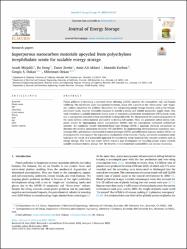Superporous nanocarbon materials upcycled from polyethylene terephthalate waste for scalable energy storage

Göster/
Erişim
info:eu-repo/semantics/openAccessTarih
2023Yazar
Mirjalili, ArashDong, Bo
Zerrin, Taner
Akhavi, Amir-Ali
Kurban, Mustafa
Ozkan, Cengiz S.
Özkan, Mihrimah
Üst veri
Tüm öğe kaydını gösterKünye
Mirjalili, A., Dong, B., Zerrin, T., Akhavi, A. A., Kurban, M., Ozkan, C. S., & Ozkan, M. (2023). Superporous nanocarbon materials upcycled from polyethylene terephthalate waste for scalable energy storage. Journal of Energy Storage, 58, 106329.Özet
Plastic pollution is becoming a universal threat affecting wildlife, marines, the atmosphere, soil, and human wellbeing. The insufficient waste management traditions, along with a growth in the "throw-away" and "single -use" culture, exacerbate the problem. Meanwhile, the fast-growing energy storage industry, such as the lithium -ion battery (LIB), requires renewable resources to provide a steady and reliable production supply chain. This work introduces a scalable industrial mature route to transform polyethylene terephthalate (PET) plastic waste into a superporous activated carbon material for rechargeable LIBs. We characterized the analytical properties of the waste-derived carbon material and used it to develop LIB anodes. Then, we generated carbon-silicon com-posite anodes by impregnating silicon nanoparticles (SiNPs) into the superporous connected architecture network. We conducted density functional-based tight-binding (DFTB+) quantum chemical calculations to elucidate the binding interactions between PET and SiNPs. By implementing electrochemical impedance spec-troscopy (EIS), galvanostatic intermittent titration technique (GITT), and differential capacity analysis (DCA), we investigated the root causes of the degradation mechanisms of the material. Finally, our techno-economical study highlights the merits of a sustainable approach for transferring waste materials into valuable products such as energy storage. This work can create further research and development for recycling plastic wastes towards scalable stationary battery storage with the benefits of environmental sustainability and circular economics.

















